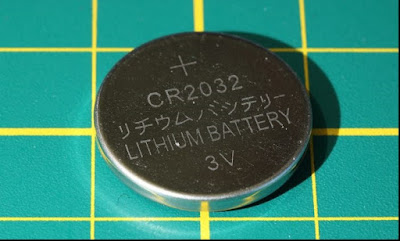The Healthcare Safety Investigation Branch (HSIB) is raising the alarm on button batteries in households with children after a child swallowed one earlier this year and died.
“These batteries pose a very real risk to small children and babies,” said HSIB’s medical director, Dr. Kevin Stewart, according to the Daily Mail. “The consequences of swallowing a button battery can be truly devastating.”
The new warning comes after health investigators reviewed the case of a young child that died after swallowing a button battery, the type often found in remote controls and toys.
The safety body said that as soon as the battery comes into contact with a wet surface, such as in the throat, nose or ear, it begins to pose a health hazard.
Contact with a moist surface causes the battery to start to discharge its current and begin a chemical reaction, which can cause surrounding body tissue to suffer significant damage.
Serious internal burns can occur, resulting in long-term problems with breathing and swallowing, and in extreme cases, these chemical burns can even cause death.
“This is why we are calling on families this festive period to be extra vigilant and to put in place some basic precautions around their house,” Dr. Steward said, according to the report.
“It’s important that everybody knows that these batteries can be found everywhere, from toys to gadgets such as remote controls, digital scales, and car fobs.
“The best way to protect children is to place everything securely out of reach and double check that all toys have screws to secure any batteries.”
I Didn’t Listen To My Instincts
George Asan, a father whose toddler Francesca died after swallowing a button battery, said in an interview with the Child Accident Prevention Trust, “I feel guilty because in that period of time I didn’t listen to my instincts.”
Francesca Asan died in May 2016 after swallowing the item.
“It was a button battery,” said Asan, who learned later from doctors what killed his daughter. “I went to the cabinet drawer, where I knew that we have the 3D glasses for the TV. It was one of the spare batteries.”
Seek Medical Help
Dr. Rachel Rowlands, of Leicester Royal Infirmary, said the batteries can cause fatal injuries even if they do not have enough charge to power a device, according to The Metro.
“I would urge everyone this Christmas to be aware of the dangers button batteries can cause if swallowed or put into the nose or ear,” she said.
“Parents or carers should bring their child to the nearest emergency department immediately if they think a child has swallowed or inserted a button battery.”
Out of Reach
Katrina Phillips, chief executive of the Child Accident Prevention Trust, told The Daily Mail, “Festive tea lights, singing Santas and flashing Christmas wands are all powered by lithium coin cell batteries, many of them easily accessible to curious little fingers.
“We’re concerned that small children put everything in their mouths, with potentially lethal consequences.
“We’re encouraging families to keep potentially dangerous products out of reach of babies, toddlers, and small children, and to be equally careful about where they store spare and used batteries.”
The Child Accident Prevention Trust has published guidelines on protecting children from the
hazards of button batteries:
Keep all spare batteries in a sealed container out of children’s reach and sight, ideally in a high-up, lockable cupboard.
Keep products with batteries well out of reach if the battery compartment isn’t secured.
Put ‘flat’ or ‘dead’ batteries out of reach straight away and recycle them safely.
Avoid toys from markets, discount stores or temporary shops as they may not conform to safety regulations, and take care when buying online or from overseas.
Teach older children that button batteries are dangerous and not to play with them or give them to younger brothers and sisters.
Source: theepochtimes.com

No comments:
Post a Comment